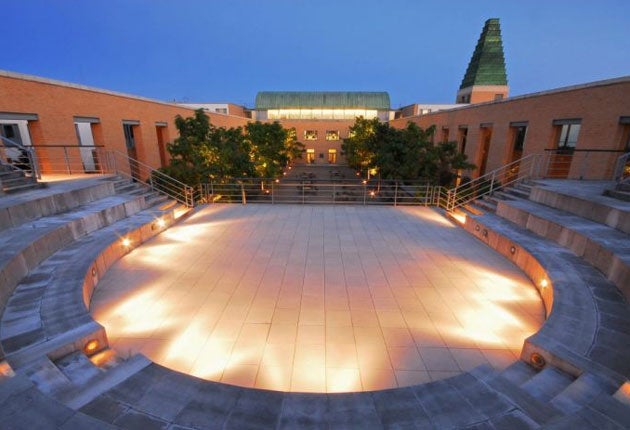
Checking the venue for a lecture at the London School of Economics early last year, I found that it was to be held not in the venerable Old Theatre, but somewhere called the New Academic Building. I stopped for directions and, when I turned the last corner, felt abashed that I'd needed to ask. Here was a vast new edifice, partly camouflaged by its old façade, looking on to the placid green of Lincoln's Inn Fields. Where had this behemoth sprung from? A helpful doorman ushered me through the gymnasium-sized atrium and down to the Sheikh Zayed Theatre
The LSE is hardly unique in accepting, with what often seems abject gratitude, Croesus-chests of foreign money. And perhaps it is just an inconvenient fact of life that spare money is to be found in countries with, er, less democratic regimes and that certain wealthy citizens may seek validation by forging links with other countries' more solid institutions. Heaven forbid that anyone says "buy". Once you start noticing the number of endowments from the oil-rich Arab countries, though, it's actually quite hard to stop.
Go to Oxford by train, and you will not be able to avoid the imposing monolith of the Said business school as you walk into town. I never pass it without recalling the hullaballoo that attended its foundation. This singularly bad-tempered quarrel was only partly about whether a business school would be a brash arriviste among the dreaming spires. It was also that the initial £20m endowment, to be matched by money raised by the university, was given by the Syrian-born arms dealer, Wafic Said – look him up – and there were those in the university who challenged the propriety of such an association.
That was in the early 1990s. Quite recently, I went to an event at the MBI Al Jaber building at Corpus Christi, a contemporary cuboid construction tucked away in the precincts of this atmospheric Oxford college – and named after its Saudi benefactor. You will find the tracks of oil money all over British academia; don't stop at London or Oxford, visit Exeter or Warwick, the School of Oriental and African Studies in London, and many, many other seats of learning.
The last government presided over a huge expansion of higher education, freeing universities to build mini-empires to cater for that expansion, raising money pretty much as they chose. I remain to be convinced that this has necessarily been a good thing. Not all academics are worldly-wise even in this day and age, yet they have been encouraged to step on to a treadmill of recruiting foreign students and raising foreign funds – because overseas students pay higher fees and abroad is where money is to be found. The result is that scholarship is pushed down the pecking order, research priorities are distorted by available funds, and university departments wake up to find they have acquired awkward bedfellows. The LSE students are the only ones so far to have mounted a protest (well done them), but their august institution is not alone.
Is football law like canon law?
What does this remind you of? An exclusive male coterie, a cloak of silence, and a belated defence to the effect that the offender has been punished and justice done. What it reminds me of is the way the Roman Catholic Church treated the priests who abused children, until such time as it finally understood that these were crimes under secular as well as canon law and had to be recognised and punished as such. The church could not be a law unto itself. In the modern world justice must be seen to be done.
Cut to Chelsea Football Club and Ashley Cole – or rather, in the light of the multi-million pound defender's silence, to the manager, Carlo Ancelotti. After it emerged – a full week after the event – that Cole had accidentally shot a work-placement student with an air rifle, Ancelotti said this. "Obviously we are not happy with what happened" – understatement of the week – "but I have spoken with him... He was very disappointed with this, said sorry, made a mistake. It was an accident. We have taken proper action... First, he [Cole] said sorry to the guy that was involved in this, second sorry to the team-mates, third sorry to the club."
So that's all right then. The fact that someone was shot and injured by a club star was just a little problem to be dealt with by "sorrys" sprayed around like post-Formula 1 champagne and a course of "proper action" decided by the club. But I'm not sure it is all right. "Chelsea justice" has the same limits as canon law; it should not be allowed to replace the law of the land.
Pity the child-free during sacrosanct half-term
So now we know what happens when "new men" with young children lead all three main political parties. The same as happens in workplaces up and down the country. They invoke a God-given right to take half-term week off in the name of their family responsibilities; they leave the country/business with a seriously depleted staff, then return to blame the child-free stand-ins for everything that has gone wrong.
I can't pinpoint the exact year, but I think it was sometime in the 1990s that half-term grew from a couple of days to a full week, entailed another foreign holiday, and precipitated a mass exodus from the workplace, often without notice. It's half-term that is the only justification apparently needed. Might I suggest that at the next half-term, Samantha, Miriam and Justine be invited to run the country, freeing the men to expatiate their family guilt. Or, if they feel that Dave, Nick and Ed would be clueless without them, how about co-opting Angela Merkel to fill in at No 10 for the week?

Join our commenting forum
Join thought-provoking conversations, follow other Independent readers and see their replies